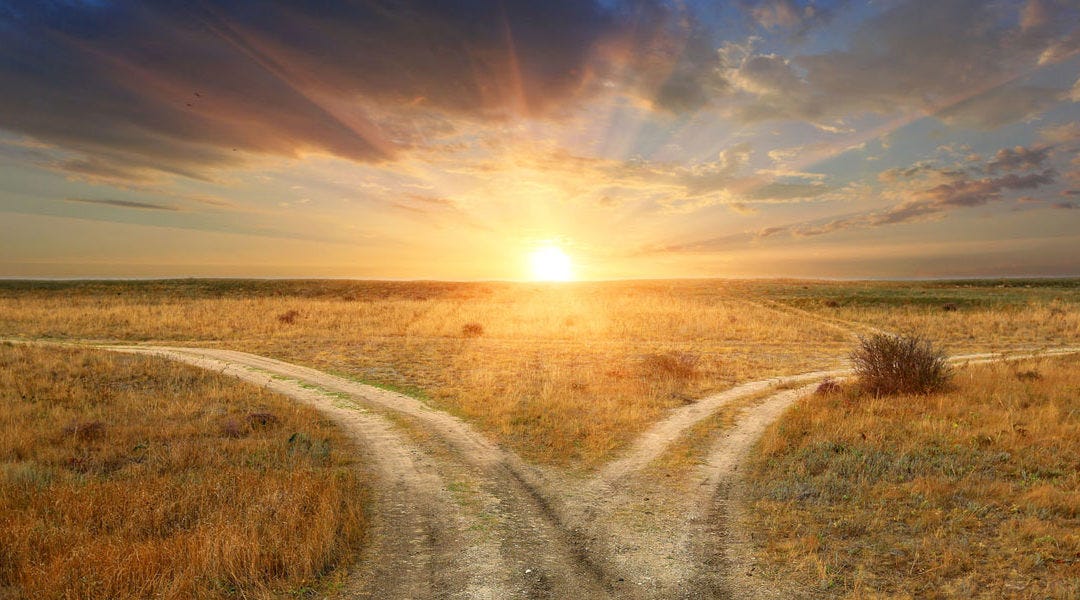Turning Points: The Unexpected Days That Change Your Story
We don’t always recognize them in the moment—but they divide our story into before and after. Here’s what I’ve learned from the turning points that changed my life.
You rarely see them coming.
But once they happen, nothing’s ever quite the same.
I’m talking about turning points—those moments when your life shifts unexpectedly, irreversibly.
You were going one direction… and then something happened.
Sometimes it was a single day. Sometimes it stretched out over a season.
Either way, you can look back and say:
“I was this before that moment. And different after it.”
Turning points aren’t typically the same as milestones.
Getting married. Having a child. Graduating. Retiring.
Those are huge, beautiful moments—but often expected ones.
They’re part of the plan. You see them coming, even if they surprise you in how they feel.
But turning points?
They hit sideways.
They don’t ask permission.
They crash the story you were writing—and insist on a rewrite.
Turning points are rarely convenient, but they’re necessary.
Some of them feel devastating.
Others feel like a sudden breath of fresh air.
Either way, they change your trajectory.
Most of us have a major turning point every decade or so.
Some of us more. Some less.
We tend to experience more of them earlier in life—when our identity is still malleable.
But that doesn’t mean you’re off the hook after 40. Or 50. Or ever, really.
Here are some of mine:
Age 13 – My family moved from a small Appalachian town in Kentucky to a wealthy suburb in Ohio. It felt like dropping a chubby, nerdy kid with a bowl cut into The Hunger Games. I was no longer home. That move changed how I saw myself—and everyone else.
Age 28 – My wife enrolled me in improv classes. That one act turned into a full-blown creative awakening. Within a year, I left the career path I thought I was stuck in and started performing six nights a week in Las Vegas. I fell in love with improv—and it gave me rules to live by off the stage as well.
Age 34 – After years in LA, I moved to Cincinnati to become a pastor again. It was unexpected. I had said I wouldn’t do it. And then I did. The call back to faith leadership came wrapped in community, purpose, and, eventually… questions.
Age 39 – I left ministry (again) and launched a business. A real one. Offices. Employees. Clients. Fear. It was a leap—and like most of mine, it came after a season of restlessness and burnout.
Age 50 – I stepped away from the business I built and started my own consulting practice and launched Called For Adventure. I had nothing lined up—except a sense that it was time. Again.
A few things I’ve noticed about my turning points:
They’re almost always preceded by a season of melancholy.
I don’t always realize I’m unhappy until the ground starts shifting under me.
But eventually, I can feel the moment arrive. Something has to change.They almost always involve my work.
That’s not because work is everything—but for me, calling has always been tied to contribution. When the container no longer fits, I have to build a new one.They often require a new community.
Not necessarily a replacement—but an expansion.
New people for the new version of me.
People who can hold space for the person I’m becoming.
Your turning points will look different than mine.
Maybe yours revolve around a divorce.
Or a diagnosis.
Or a deep spiritual shift.
Maybe you lost someone you love—or gained clarity about something you can’t unsee.
Whatever they are, your turning points deserve your attention.
They always launch a new chapter in your story.
Try this:
Open your calendar app.
Pick a time—just 30 minutes—and label it “Turning Points.”
When that appointment comes, sit somewhere quiet.
Think through your life.
Make a list of the moments—big or small—that shifted your direction.
Then look for the themes.
What tends to happen right before a major change in your life?
What do your turning points tend to cost you?
What do they tend to give you?
If you’re feeling brave, comment below.
Tell us what you found.
You’re not alone.
Turning points may knock the wind out of you, but they also give you a new direction.
And often, that’s exactly what needed to happen.





You’re right, Joe. Turning points crash into us like uninvited dinner guests from the divine. And just when we’ve finally figured out how to use the old map, the universe laughs and hands us a flaming new one labeled “You Are Here Now, Sucker.”
But here’s the twist most folks miss: the biggest turning points don’t change your story—they expose it. They peel back the layer you’ve been living and whisper, “Hey, this isn’t who you are. It’s just who you agreed to be.”
Whether it’s a job quit, a belief cracked, or a pair of spiritual skinny jeans that finally stopped fitting, the real shift is in your vision. You don’t need a new story—you need to remember the old one before fear hijacked the pen.
So yes, block that 30 minutes. But don’t just list events. Sit still long enough to hear what version of you each moment was trying to resurrect.
Spoiler alert: Resurrection is less about coming back from the dead, and more about finally waking the hell up.
With love and exorcisms,
Virgin Monk Boy
"You can only connect the dots when looking back"... I can now see many turning points that went unrecognized. It leaves lots to unpack.... " Two roads diverged in a yellow wood...." I am that one traveler!